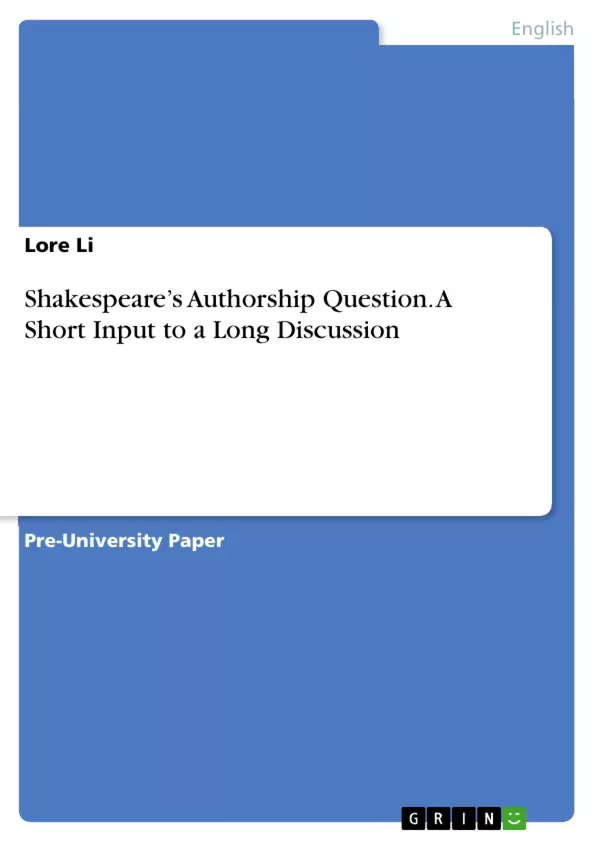William Shakespeare was born in 1564 and died in 1616 in Stratford-upon-Avon farther writing plays like "Romeo and Juliet", "Othello", "Macbeth", "A Midsummer Night’s Dream" and others. He was a brilliant playwright creating nearly 40 productions and 154 sonnets, while dwelling in London. This is at least the majority opinion taught in schools.
There is however reason for doubt. While dealing a bit deeper with Shakespeare you unavoidably will come to the point that opinions differ in the question if he truly was who he pretended to be. Imagine the magnificent bard was not the author of all the dramas, comedies, history plays and poems. Or could it be possible that this famous name was just a pseudonym? And if it was, then the question is why? Which clues for and against are existing?
In the English lessons we learned the prevailing aspects along with the common view about the grand composer and his plays. After a rough contribution into the authorship debate more questions emerged and the foundation of this term paper was laid.
To come to one of many answers, this work will be structured at first in a short biography of Shakespeare and an overview of his time concerning the theatre and authorship in general. Afterwards I would like to explore positions that assume Shakespeare not to be the man who is thought to be the drafter Shakespeare. On the other hand also the opposing view will be presented and explained. To forge an own profound opinion it is significant to have a review about this complex of themes.
A detailed presentation of my own view regarding arguments for and against Shakespeare from Stratford as the writer will be followed by a final synopsis and prospect of the issue.
So the focus in this work is more on investigate the Stratford-man than on other theories, even though these will come up for discussion. Because of their multifacetedness it would go beyond the scopes of this term paper.
Table of Contents
- Introduction
- Overviews of Shakespeare and his time
- Short biography of Shakespeare
- Theatre and authorship in the Elizabethan and Jacobean time
- Theories about his authorship
- Christopher Marlowe
- Edward de Vere, 17th Earl of Oxford
- Francis Bacon
- William Stanley, 6th Earl of Derby
- Group theory
- William Shak(e)spe(a)re
- Own argumentation
- Contra Shakespeare
- Pro Shakespeare
- Summary
- Conclusion and prospect
- Sources
- Electronic Resources
- Books
- Enclosure
Objectives and Key Themes
This term paper aims to investigate the authorship of William Shakespeare's works by exploring both arguments for and against the traditional attribution to the Stratford-upon-Avon man. The paper will delve into the life and times of Shakespeare, examine alternative theories regarding his authorship, and present a reasoned opinion on the matter.
- Shakespeare's biography and the context of his time
- Theories challenging Shakespeare's authorship
- Arguments supporting Shakespeare's authorship
- The significance of the authorship debate
- A personal perspective on the issue
Chapter Summaries
The introduction lays out the basis for the authorship debate, highlighting the uncertainty surrounding Shakespeare's identity as the author of his works. This is followed by a short biography of Shakespeare, assuming he is the author, and an overview of the theatrical landscape during the Elizabethan and Jacobean periods.
The paper then examines various theories suggesting that Shakespeare was not the true author of his plays and poems. These include the theories of Christopher Marlowe, Edward de Vere, Francis Bacon, William Stanley, and the group theory. The paper also explores arguments in favor of Shakespeare's authorship.
The paper concludes with a summary of the key points discussed and a personal perspective on the authorship debate. The paper emphasizes the importance of considering all evidence and perspectives when forming an opinion on this complex and multifaceted issue.
Keywords
The primary keywords and focus topics of this paper are: William Shakespeare, authorship debate, Elizabethan and Jacobean theatre, biographical evidence, alternative authorship theories, literary analysis, historical context, and personal perspective. The paper explores the complexities of attributing authorship to Shakespeare and examines the evidence from various perspectives.
Frequently Asked Questions
What is the Shakespeare Authorship Question?
It is a long-standing debate about whether William Shakespeare of Stratford-upon-Avon was the actual author of the plays and sonnets attributed to him, or if the name was a pseudonym for another writer or group.
Who are the most prominent alternative candidates for authorship?
Key candidates discussed include Christopher Marlowe, Edward de Vere (17th Earl of Oxford), Francis Bacon, and William Stanley (6th Earl of Derby).
What is the "Group Theory"?
This theory suggests that the works were not written by a single individual but were the collective output of a group of highly educated writers or noblemen.
What are common arguments against the Stratford-man as author?
Doubters often point to the lack of records regarding his education, his humble background compared to the aristocratic knowledge displayed in the plays, and the absence of personal letters or manuscripts.
Why would an author use a pseudonym during Elizabethan times?
Possible reasons include political safety, the social stigma attached to noblemen writing for the public theatre, or the controversial nature of some of the works' content.
- Arbeit zitieren
- Lore Li (Autor:in), 2015, Shakespeare’s Authorship Question. A Short Input to a Long Discussion, München, GRIN Verlag, https://www.grin.com/document/302077



